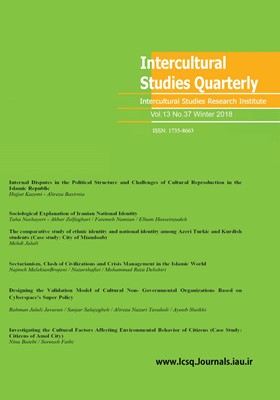Designing the Validation Model of Cultural Non- Governmental Organizations Based on Cyberspace's Super Policy
Subject Areas : INTERCULTURAL STUDIES QUARTERLYrahman Jalali Javaran 1 , SANJAR salajagheh 2 * , alireza manzari tavakoli 3 , Ayoub Sheikhi 4
1 - Ph.D. student of public administration, decision making and policy making, Islamic Azad University, Kerman Branch, Iran
2 - استادیار علوم تربیتی ،دانشگاه آزاد اسلامی، واحد کرمان
3 - استادیار مدیریت دولتی، دانشگاه آزاد اسلامی، واحد کرمان
4 - Assistant Professor, Department of Statistics, Shahid Bahonar University of Kerman, Iran
Keywords: environment, Cultural Elements, Amol, Environmental Behavior,
Abstract :
Cyberspace is now an integral part of human life. Navigation, guidance, control and care in this vast sea can not be easily feasible. The complete entrance in this area can not be done by any government, unless there is a massive popular force in this area, and the government will establish and facilitate the arrival of the people in this regard. In this article, we try to use the comments of cultural experts and extract strategic points from the statements of the Islamic revolution Leader and use the method of "Thematic Analysis" to identify the basic indicators of validation of popular collections active in the field of cyberspace. The most important result and findings of this article is the presentation of a framework that serves as an operational road map that can be evaluated by non-governmental organizations according to designed indicators. Therefore, a local model for evaluating cultural organizations in the field of cyberspace in order to determine the main policies in the field of cyberspace and increase social participation in the Islamic Republic of Iran is very necessary. This model, while taking advantage of the new patterns of policy evaluation, keeps us from harming commonly used evaluation models.
ابراهیم بای سلامی غلام، حیدر (1386). «فرهنگ و سیاستگذاری در ایران«، فصلنامه مطالعات فرهنگی و ارتباطات، دوره 2، ماره 5، بهار و تابستان، صص 213-234.
خاشع، ش (1383)، نقش سازمانهای غیر دولتی در پیشبرد اهداف توسعه هزاره سوم
سیاری، مجید؛ سیاری، هادی و ابراهیمی، حسین (1385). اعتبار سنجی و ارزشیابی بیرونی در نظام آموزش عالی، تهران: مکتب ماهان.
صادقی، محسن (1385). «تهدید واگذاری فعالیتهای فرهنگی به سازمانهای مردم نهاد»، روابط فرهنگی، صص 18-23.
عابدی جعفری، حسن؛ تسلیمی، محمد سعید؛ فقیهی، ابوالحسن و شیخ زاده، محمد (1390). «تحلیل مضمون و شبکه مضامین»، اندیشه مدیریت راهبردی، صص 151-198.
علوی تبار، علیرضا (1373). «ملاحظات اساسی در سیاستگذاری فرهنگی ایران»، فصلنامه راهبرد، شماره 3.
کوهکن، علیرضا (1389). بررسی نقش و کارکردهای سازمانهای غیر دولتی بینالمللی، تهران: مرکز پژوهشهای مجلس.
گلشن پژوه، محمدرضا (1386). راهنمای سازمانهای غیر دولتی، تهران: ابرار معاصر.
مؤذن جامی، محمد هادی (1386). «نقش مشارکت مردمی در تقویت بنیه اجتماعی»، فصلنامه علوم اجتماعی، صص 66-107.
نیاز آذری، کیومرث (1383). اعتبار سنجی و آموزش عالی از کلاسیک تا مجازی، تهران: فراشناختی اندیشه.
یادگار زاده، غلامرضا و پرند، کوروش (1385). «اعتبار سنجی و تضمین کیفیت در نظام آموزش عالی سوئیس»، مدیریت فردا، شماره 13 و 14، بهار و تابستان، صص 43-53.
Braun, V., & Clark, V (2006). Using thematic analysis in psychology. oualitative research, 77-110.
Hughes, M., & Aville Kushner (2005). Evaluation of systems. Encyclopedia of Evaluation.
Stufflebeam, D., & Shinkfield, A (2007). Evaluation theory model and application. jossey-bass.
_||_
